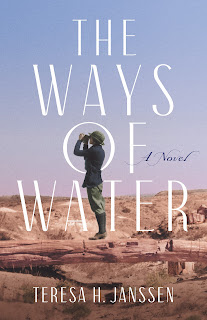
Photo by David Conklin Photography
Teresa H. Janssen is the author of the new historical novel The Ways of Water. Also an educator, she lives on Washington state's Olympic Peninsula.
Q: Why did you decide to write a novel inspired by your grandmother's life?
A: My grandmother and I were very close. She and my aunt came over to our house nearly every weekend when I was young.
When she was in a nursing home in Seattle, while I was in graduate school at the University of Washington, I would often take the bus to visit her there.
I would ask her to tell me about her childhood. She often repeated the same stories, but sometimes new memories would surface, and I took notes. She died in 1988 at the age of 86.
On what would have been her hundredth birthday, as a way to honor her, I decided to write a short summary of facts of her life to send to my family. I realized that there was still so much I didn’t know about the Southwest in the early 1900s, so I began some preliminary research.
I became fascinated by the cultural and social shifts she experienced during her early years, as well as the personal hardships she had to surmount. I decided to write much more than a summary, rather a fuller narrative that grew and grew.
Then, because of many unknowns that I would need to fill in with my imagination and my desire to bring the personalities of my family to life with dialogue, I realized that historical fiction was the best means to tell the tale.
I set it aside for many years as my life got busier, but during the Covid pandemic with more time at home, decided to dust it off, edit some more, and find a publisher to send it out to the world.
Q: How did you research the novel, and what did you see as the right blend of fact and fiction as you wrote it?
A: I soon realized after interviewing family members that there were several versions of stories I’d heard and that the truth was sometimes difficult to know. I discovered that I had not asked my grandmother enough specific questions.
I learned that my grandmother’s itinerant girlhood was more chaotic than I had known (she had spared me much) and that there was too much story to tell. I would need to choose highlights of those years and leave other locations and episodes out.
Once I had an outline written, I was able to streamline my research, which I conducted over several years while teaching in the local schools and raising my four kids.
I remember researching railroading once in the dentist’s chair. I began reading histories of key topics, places, and events of the time. I researched homesteading in the Southwest, vanadium mining, the Singer Company, cigars, the Model T, the Mexican Revolution, railroad towns of the Jornada del Muerto, old Austin, Bisbee, Tucson, and San Francisco, The Bisbee Deportation, hiking on Mt. Tamalpais, the tuberculosis and influenza epidemics, and other topics.
I took several trips to the Southwest to get the feel of the environment and see vestiges of the old Southwest for myself.
The research was fascinating, and as I learned more, I became more respectful of the hardships that the climate and isolation brought and more understanding of the losses, heartaches and disappointments of both the indigenous peoples who were displaced and the settler families during those boom-and-bust years.
Q: How was the book’s title chosen, and what does it signify for you?
A: I chose the title about eight years ago. Water was precious (and still is) in the arid lands where my grandmother lived…from the dearth of water in the desert, to the effects of the damming of the Rio Grande, to the oft-changing temperament and course of a river (like Josie’s life).
It encompasses the role of water as healer and life-giver and the metaphor of nearly drowning and saving oneself.
Q: What do you hope readers take away from the book?
A: An affection for the flawed but tenacious protagonist, Josie. I hope they are in some way moved by her journey and that of their own forebears.
I hope they gain a renewed understanding of the sometimes dizzying changes that took place during the first two decades of the 20th century and can see parallels with our experiences now.
I hope it brings some perspective and testimony to the meaning of family and the strength of the human spirit.
Q: What are you working on now?
A: I am working on a memoir and a collection of short stories. I still write creative nonfiction essays when a topic grabs me.
Q: Anything else we should know?
A: Feel free to ask!
--Interview with Deborah Kalb

No comments:
Post a Comment